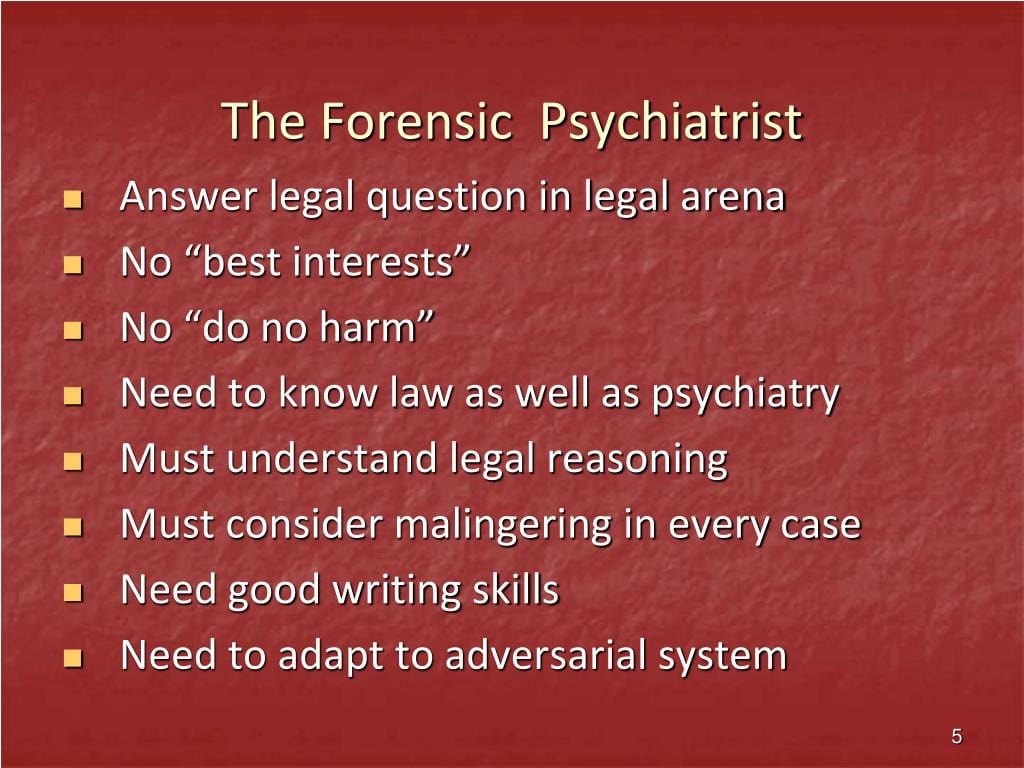Forensic psychiatry sits at the fascinating intersection of mental health and the law. These specialized medical doctors act as detectives of the mind, unraveling complex psychological puzzles within the legal system. Their expertise is crucial in criminal cases, civil disputes, and correctional settings, ensuring fair legal proceedings and appropriate mental health care for individuals involved with the law.
Decoding the Role of a Forensic Psychiatrist
Forensic psychiatrists are medical doctors specializing in psychiatry who apply their knowledge within the legal system. They bridge the gap between mental health and the law, offering expert evaluation and testimony in legal proceedings. Their work extends beyond criminal cases, contributing to civil matters, risk assessments, and treatment plans for individuals navigating the legal system. Becoming a forensic psychiatrist requires extensive training, including medical school, psychiatric residency, and specialized fellowships.
Key Responsibilities: Where the Mind Meets the Law
- Assessments and Evaluations: Forensic psychiatrists evaluate an individual’s mental state, using interviews, psychological testing, and record reviews to determine competency to stand trial, criminal responsibility, and risk of future violence. This information is critical for judges and juries in making informed decisions. Learn how efficient employee screening can help businesses hire the right candidates.
- Treatment: Beyond assessment, forensic psychiatrists develop and implement tailored treatment plans for individuals with mental disorders in legal settings, including jails, prisons, and forensic hospitals. These plans may incorporate medication, therapy, and other interventions aimed at rehabilitation and reducing recidivism.
- Expert Witness Testimony: In court, forensic psychiatrists provide expert insights, explaining complex psychiatric concepts to judges and juries in understandable language. Their testimony can be pivotal in ensuring that legal decisions are grounded in a sound understanding of mental health.
- Collaboration for Better Outcomes: Forensic psychiatry is a team effort. These specialists collaborate with lawyers, social workers, correctional officers, and other professionals to ensure comprehensive care that addresses both legal and mental health needs.
- Research and the Evolving Field: Forensic psychiatry is a dynamic field. Ongoing research explores new ways to assess mental states, predict risk, and provide effective treatment. This continuous evolution suggests that the role of forensic psychiatrists will likely become even more crucial in navigating the complexities of mental health within the legal landscape.
What is a Forensic Psychiatrist?
A forensic psychiatrist is a medical doctor specializing in psychiatry with additional training and expertise in the legal aspects of mental health. These professionals serve as a bridge between the mental health and legal systems, applying their unique understanding of both fields to a variety of legal contexts. They assess mental states, provide expert testimony, and develop treatment plans, playing a crucial role in ensuring that mental health factors are properly considered in legal proceedings. With identity theft and fraud on the rise, protecting personal data is more important than ever. Discover how Experian IdentityWorks can help safeguard your sensitive information.
Core Activities of a Forensic Psychiatrist:
- Assessment: Conducting in-depth interviews, reviewing medical records, and administering psychological tests to evaluate an individual’s mental state.
- Expert Testimony: Explaining complex psychological concepts to judges and juries, offering expert opinions on issues like competency to stand trial, criminal responsibility, and risk assessment.
- Treatment: Developing individualized treatment plans, prescribing medications, and providing therapy in prisons, secure hospitals, and other settings for individuals with mental illnesses involved with the legal system.
- Consultation: Advising legal professionals on mental health issues relevant to their cases.
- Research: Contributing to ongoing research on the relationship between mental health and the law.
Distinguishing Forensic Psychiatry from Other Fields:
- Psychiatry: General psychiatrists focus on diagnosing and treating mental illnesses in clinical settings, while forensic psychiatrists have additional training related to legal issues.
- Psychology: Both assess mental states, but forensic psychiatrists are medical doctors who can prescribe medication, while forensic psychologists hold doctoral degrees in psychology and focus on psychological testing and assessments.
How to Become a Forensic Psychiatrist: A Roadmap to Qualifications and Career Success
Forensic psychiatry requires a unique blend of medical expertise, psychological insight, and legal acumen. The path is rigorous, involving years of dedicated training and specialized qualifications, but rewarding for those passionate about mental health and law. Forensic psychiatrists play a vital role in the criminal justice system, assessing mental health and providing expert testimony.
Steps on the Path to Forensic Psychiatry:
| Step | Description | Duration |
|---|---|---|
| Medical Degree (MD/DO) | Foundational medical training covering a broad range of medical sciences. | 4 years |
| Psychiatry Residency | Specialized training in the diagnosis, treatment, and management of mental illnesses. | 4 years |
| Forensic Fellowship | Focused training on the intersection of psychiatry and law, including legal evaluations and expert testimony. | 1-2 years |
| Medical Licensure | Required to legally practice medicine in your state/country. Involves passing exams and meeting specific requirements. | Varies |
| Board Certification | (Optional) Demonstrates advanced expertise and signifies meeting rigorous professional criteria. | Ongoing |
Essential Skills Beyond Medical Qualifications:
Beyond formal qualifications, essential skills for a forensic psychiatrist include:
* Communication: Effectively conveying complex information to patients, legal professionals, and others.
* Critical Thinking: Analyzing complex scenarios and making objective judgments.
* Analytical Skills: Evaluating evidence, identifying patterns, and forming expert opinions.
* Ethical Decision-Making: Navigating the ethical complexities of legal and clinical settings.
* Impartiality and Objectivity: Maintaining unbiased perspectives, crucial in legal proceedings.
Unlocking the Earning Potential: What’s the Highest Salary for a Forensic Psychiatrist?
Forensic psychiatry, a specialized field demanding a unique skill set, often comes with significant financial rewards. While earnings can vary widely based on experience, specialization, and location, top earners in the field can command impressive salaries. Forensic psychiatrists can earn top salaries exceeding $384,000 annually, but the average is closer to $222,000. This highlights the wide earning potential within this specialized field.
US Salary Insights:
- Average: Around $222,000 annually.
- High End (86th percentile): Exceeding $384,000 annually.
- Entry-level positions may start considerably lower.
UK Salary Insights:
- Average: Around £132,832 annually.
- High End: Reaching £693,354 annually for highly experienced consultants.
Factors Influencing Compensation:
- Experience: Like many fields, experience significantly impacts earning potential. Senior forensic psychiatrists with decades of experience command higher salaries.
- Specialization: Forensic psychiatrists may choose sub-specialties like addiction, child psychology, or criminal profiling. Some specializations, based on demand and required expertise, might offer higher compensation.
- Location: Salaries can vary significantly based on location, with major metropolitan areas often offering higher pay due to higher cost of living and increased demand.
- Employer Type: Private practice versus public sector employment can also influence earnings. Private practices may offer higher earning potential, but also come with different challenges and responsibilities.
Ongoing research continually explores new understandings of mental health and its intersection with the legal system, suggesting the field of forensic psychiatry will likely continue to evolve, impacting future salary trends and specialization areas.
- Unlocking Francis Alexander Shields’ Finance Empire: A Comprehensive Biography - July 12, 2025
- Unveiling Francis Alexander Shields: A Business Legacy - July 12, 2025
- Francis Alexander Shields’ Business Career: A Comprehensive Overview - July 12, 2025















